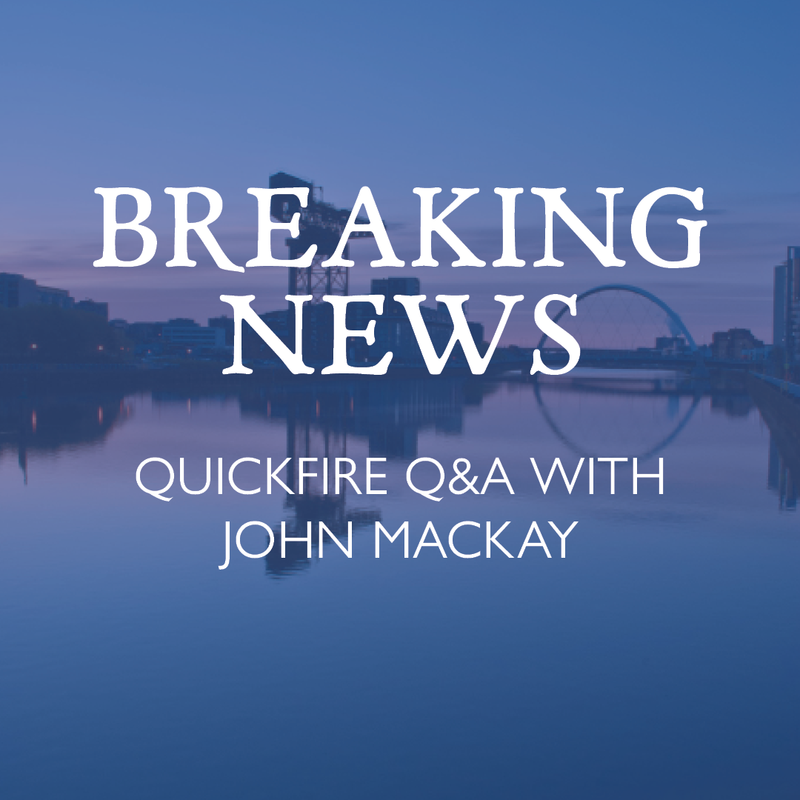Breaking News
A Quick-fire Q&A with John MacKay

A Quick-fire Q&A with John MacKay
Join us as John MacKay, author of Scotland Today & Yesterday takes part in our series of quick-fire Q&As!
What is a quick-fire Q&A?
We have our interviewee pick a number at random and we ask them the general question listed next to it.
Shortly after we switch to asking book-specific questions, to give you a brief insight into our wonderful writers and their books.
_____________________________
What inspired you to start writing books?
I had a love of writing which I probably didn't fully appreciate myself, but at school, I always enjoyed writing. Unlike a lot of my friends, an afternoon class, English class in the sunshine, writing a story was a kind of happy place for me. And a teacher recognised that and suggested that I might consider writing a book, because at that point I never had. So that's basically what inspired it.
If you could invite three famous guests to dinner, dead or alive, who would they be?
The honest answer to that is I wouldn't invite famous people! There are people I would invite… but anyway, that's not the question you're looking for. That's an interesting one. I suppose it would have to be: Jesus Christ; the one person I always wanted to interview as a journalist because you knew you were never going to get the chance was the Queen, because she'd met so many people, particularly prime ministers; and I suppose, Bruce Springsteen. Yeah. Let's put Bruce Springsteen in there.
What advice would you give to any aspiring authors?
Do it. You know, the discipline of doing it, you've got to write it down. No point thinking about it and dwelling upon it. The actual doing of it, personally, I always found that things developed when I sat and actually did the writing, that’s how things developed.
So, just do it, finish it, and then after that you can see where it takes you.
What is something you take everywhere with you?
This isn't very exciting but my phone. I am one of those people, sadly, and I grew up for most of my life without these phones. But they're such an important part of you. Like, everything's on it. I don't even carry cash anymore. So I'd be in a very uncomfortable place without my phone.
Why do you think people should read this book?
It cuts across a whole lot of genres. It's history. It's social history. It's politics. It's journalism. And it's a past that we have all shared. It's all there. We've all experienced this and it will bring it to life for people.
Why did you choose the title you did?
The book was originally released under the name Notes of a Newsman. And when I was looking to expand it and re-release it, that name struck me, on reflection, as maybe not that exciting. The title should say what the book does, and for two reasons that works for me because it is Scotland today, the Scotland we’re in just now, and it is yesterday. It's the Scotland of the past and the two of them combined to explain how we got here today. And also, when I first started broadcasting at STV, the program was originally called Scotland Today. So that seemed to tie in nicely.
Why did you choose the cover?
The cover is actually the product of great work from the publishers. From Luath Press. They came up with a number of ideas and almost from the beginning, I could see that it really appealed to me, on any number of levels. It shows Scotland's past through the use of the Titan crane. It also, and I don't think this is deliberate, I think this is by chance, it also looks very much like the book that was produced for the Scottish independence referendum. And the independence referendum plays a big part in the book. Obviously. So there are echoes of that in it. And it's very bold. I like the title. It's not too complicated. So on every level I thought, this is it, it'll do me.
What do you wish you'd known when starting the writing process for this book?
This is slightly different from any other book I've done. I normally write fiction and the lessons you can learn from that are numerous, I’m still learning a great deal on that. But, this book is very much my terrain. It's something I'm very comfortable with, scripting and news. So, I think that's probably why I actually found this less challenging than I do fiction books, because it's something I know inside out.
So, did I learn stuff? Nothing that helped me with a book. But what I did learn was how flawed memory can be. Things that I seemed to remember very clearly, when I went back to research, you find that it's not precisely as I remembered. But that's something I learned. That's not something I wish I knew.
It doesn't really answer your question, but that's the truth of it.
What was your favourite thing about writing this book?
I'm quite an archivist, just a personal archivist. And I like going back through stuff, I like reflecting on stuff. So, for me, it was as much a pleasure as anything else. Reviving memories, talking to people I worked with and getting their recollections as well, just bringing all that back to life. That, for me, is something thrilling. The future will take care of itself but the past is something I like looking back on.